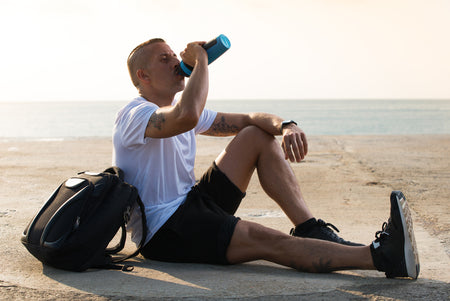When it comes to peak performance in sports, athletes often focus on rigorous training regimens, meticulously choosing equipment like the latest Nikes or Adidas, and mastering new techniques. But one crucial factor often gets overlooked: hydration. While it seems simple, proper hydration has a profound impact on both the physical and mental performance of athletes across all disciplines, from endurance runners to basketball players on the court or volleyball players diving for a dig.
Why Hydration matters for athletes
Hydration goes beyond simply quenching thirst. It impacts a range of physiological processes that directly affect sport performance:
Cellular function and performance:
Water is the medium within which all cellular processes occur. Proper hydration ensures your cells function optimally, delivering peak performance during training and competition.
Regulation of body temperature:
Adequate hydration allows you to sweat efficiently, preventing your body from overheating and compromising performance.
Cognitive function and focus:
Water is vital for proper brain function. Hydration keeps you alert, focused, and sharp, allowing you to make quick decisions and react effectively in fast-paced environments.
Reduced risk of injury and cramps:
Dehydration can stiffen muscles and reduce their flexibility, increasing the risk of muscle strains, cramps, and other injuries. Staying hydrated keeps your muscles supple and helps prevent these setbacks.
The impact of dehydration on performance
Dehydration can significantly hinder your performance on the field or court. Even mild dehydration (loss of 2% body weight through sweat) can lead to decreased endurance and fatigue, reduced muscle power and strength, and an increased risk of heatstroke. Imagine a basketball player experiencing fatigue in the final quarter or a volleyball player struggling with muscle cramps during a crucial set, dehydration can be the silent culprit behind these performance dips.
The impact of hydration on mental performance
Your brain is heavily reliant on water to function effectively. When dehydrated, even by a small amount, cognitive performance can suffer. This can manifest as decreased alertness, difficulty concentrating, and slower reaction times. By staying hydrated, athletes can maintain mental clarity, focus, and sharpness, giving them a crucial edge in the competitive arena.
What is best to drink?
For most athletes, plain water is still an excellent choice for hydration during exercise. However, there are other options to consider depending on the specific needs of the athlete and the training scenario:
Water with electrolytes:
For extended exercise sessions (over an hour) or intense workouts in hot weather, water with added electrolytes like sodium, potassium, and magnesium can be beneficial. These electrolytes help replace what is lost through sweat and can aid in fluid retention. Look for commercially available electrolyte-enhanced water or consider adding a small amount of electrolyte powder to your water bottle.
Coconut water:
Coconut water is a natural source of electrolytes and carbohydrates. While not a magic elixir, it can be a refreshing option for athletes who find plain water unappealing, particularly in hot and humid conditions. However, it's important to note that coconut water generally has lower sodium content compared to some commercial sports drinks.
Diluted fruit juices:
Diluting 100% fruit juice with water can provide some carbohydrates and electrolytes alongside hydration. However, be mindful of the sugar content in juices, and limit your intake to prevent blood sugar spikes and crashes.
Recommended water intake
The recommended daily water intake can vary depending on several factors, including body weight, activity level, and climate. However, a general guideline suggests consuming around 30–35 milliliters of water per kilogram of body weight per day.
So, for an athlete weighing 80 kilograms, the calculation would be:
30 mL/kg * 80 kg = 2400 mL
This means the athlete should aim to drink around 2.4 liters of water per day to stay adequately hydrated.
Athletes who engage in strenuous exercise or train in hot weather may need to consume even more fluids.
Following these tips and making hydration a priority, athletes can ensure their bodies are functioning at peak capacity, maximizing their physical and mental performance on the field or court. Remember, proper hydration is a game-changer, and it's just as important as your training gear!









































